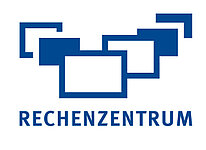Collaborators
The Core Unit Research Data Management in Würzburg is actively engaged in communicating and implementing cutting-edge solutions to improve Research Data Management practices and support a range of research projects. This is a snapshot of our collaboration network:
UKW Service Center Medical Informatics (UKW SMI)

The Service Center Medical Informatics oversees the seamless operation of software, hardware, servers, and communication systems at University Hospital Würzburg (UKW, from the German acronym for University Klinikum Würzburg). Their role extends to supporting and modeling healthcare processes using a range of IT tools. They handle the conception, implementation, development, and support of information services, including hospital and laboratory information systems.
Together with their technical expertise, we are working towards creating a Virtual Research Campus that will integrate with the Virtual Research Environment of the Berlin Institute of Health at Charité and extend its functionalities to the UKW network.
Rechenzentrum Würzburg

The Information Technology Centre (RZUW, from the German acronym for Rechenzentrum Universität Würzburg) is an essential infrastructure facility located in Würzburg, Germany. This center primarily serves as a hub for data processing and information technology services. It plays a critical role in supporting the IT needs of various institutions, including academic and research establishments in the region.
One of the notable features of the RZUW is its advanced computing capabilities. It hosts powerful servers and high-performance computing resources, which are crucial for complex data analysis, scientific research, and educational purposes. These resources enable researchers and academics to perform computationally intensive tasks, such as simulations, large-scale calculations, and processing of massive data sets.
In addition to its computational prowess, the RZUW is also known for its commitment to data security and integrity. It employs robust security protocols and state-of-the-art technologies to ensure the protection of sensitive data. This aspect is particularly important given the center's role in handling data from various critical sectors, including healthcare, finance, and education.
Furthermore, the RZUW is actively involved in promoting digital literacy and IT education. It often collaborates with educational institutions to provide training and workshops on various IT topics, thereby contributing to the development of digital skills.
For the scientists of the University of Würzburg, the RZUW, the University Library and the Research Advancement Centre are pooling their competences in research data management: https://www.uni-wuerzburg.de/en/rdm/
Bioinformatics in Würzburg – A Pioneer in Research Data Management
The Department of Bioinformatics at the Biozentrum of the University of Würzburg, led by Prof. Dr. Thomas Dandekar, has long been a strong advocate for modern, FAIR-compliant, and sustainable research data management (RDM) in Würzburg. As an NFDI-Microbiota ambassador, Prof. Dandekar actively promotes the principles of Germany’s National Research Data Infrastructure (NFDI) and helps integrate them into daily research workflows.
The Bioinformatics Department supports the adoption and evaluation of open-source electronic lab notebooks (ELNs), and contributes to the development of the university's research data infrastructure. This includes institutional data storage servers, a collaborative Nextcloud system, and high-performance computing (HPC) resources with an associated JupyterHub platform for interactive data analysis.
Of particular importance is the department’s collaboration with several research consortia in Würzburg, which serve as practical use cases for the emerging centralized research data management (cRDM) framework. Through this active involvement, the Bioinformatics group plays a key role in anchoring digital research practices across Würzburg’s scientific community.
Berlin Institute of Health at Charité (BIH/ Charité)
The Berlin Institute of Health at Charité (BIH/Charité) is dedicated to medical translation, aiming to translate biomedical research into personalized strategies for prediction, prevention, diagnostics, and therapy. Clinical insights, in turn, drive new research ideas. The BIH focuses on establishing a comprehensive translational ecosystem, fostering a cross-organ understanding of health and disease, and promoting a cultural change in biomedical research.
Funded by the BIH/Charité, the Virtual Research Environment (VRE) is a data management platform that enables medical researchers to store, find, access, analyze and share their data, including sensitive data, thus breaking down barriers for biomedical research and innovation.
The VRE is a portable solution and a community-driven development project. It follows the FAIR principles for scientific data management and demonstrably complies with GDPR requirements. We are currently testing the platform as users, evaluating a pilot installation at UKW, participating in user meetings hosted by Charité, and exchanging knowledge. In this context, we are discussing the feasibility of installing the platform at UKW and assessing the usability of this type of software. Notable strengths include its strong GDPR compliance and a data infrastructure that is fundamentally designed for FAIR research data management and security.
The German National Research Data Infrastructure (NFDI)

The German National Research Data Infrastructure (NFDI, from the German acronym for Nationale Forschungsdateninfrastruktur) was established to address Germany's growing demand for effective research data management. It serves as a structured framework for data preservation, accessibility, and collaboration across diverse research domains.
The NFDI operates through different consortia, each dedicated to specific research domains, ensuring comprehensive coverage while fostering interdisciplinary collaboration. This spatial organization allows for domain-specific expertise within a cohesive, nationwide approach.
In the short term, the NFDI focuses on identifying, harmonizing, and curating existing research data collections, supporting data management planning, and providing valuable training resources for researchers.
Long-term objectives include creating a nationwide network of data repositories, metadata standards, and services to empower researchers in navigating the data landscape seamlessly. This initiative contributes to addressing global research challenges by fostering collaboration and responsible data management.
For further information and resources, explore the NFDI consortia overview to find domain-specific consortia that align with your research interests.


